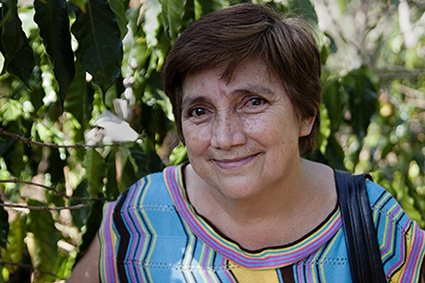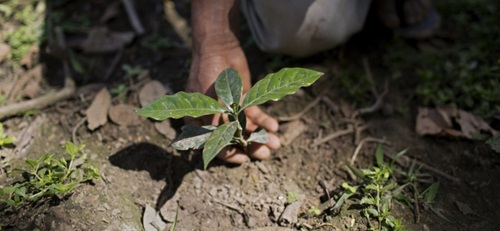The climate crisis is already badly affecting global food production. Fairtrade farmers like Ebrottié in Côte d’Ivoire, Zeddy in Kenya and Theresa in Nicaragua, suffer the effects, leaving them working longer, for less, and damaging their community.
Making sure that farmers’ voices are heard is exactly why the Fairtrade Foundation is part of the Climate Coalition, a group of over 130 organisations across the UK, working towards a world powered by clean and secure energy.
So here – in their own words – is what the climate emergency means for Fairtrade farmers working around the world.
‘This year we lacked food because of the heat’
Ebrottié Tanoh Florentin, a cocoa farmer in Côte d’Ivoire, speaks about the effects of the climate crisis on cocoa farming families.
‘Climate change is a global issue. We, the farmers, have to deal with its consequences every day. For instance, this year we lacked food because of the heat. The production decreased this year too, so this affects the economy. People harvested less and received less money. So we all suffer from the negative consequences of the climate: it impacts the environment and our economy.
‘There will be a food shortage because of the heat whereas, before, there were a lot of forests, the rains were regular and the seasons were well divided. It was easier. There were four seasons, now we don’t know anymore when we should plant and when we should stop.
‘Climate change has an impact on crops which results in less money and food available. There is also a lack of workforce, because the cocoa farming is not profitable anymore. Young people who used to work with us do not come anymore. The farmer is left with his family, struggling to keep the production because of the negative effects of climate. These are the difficulties we currently face.’
‘We fear low coffee production in future’
Zeddy Rotich, a coffee farmer in Kenya, explains how Fairtrade has helped her take action on the climate crisis locally.
‘Climate change is affecting us because the weather patterns have changed. We fear low coffee production in future because of it. But through Fairtrade we have received training on climate change and we are taking action. However, we still need more, because we need to train other people who are not aware about climate change.
‘We also need more tree nursery beds, so that we can plant more trees as a way of tackling climate change.’
‘We are responsible for the erosion of our soil’
Teresa Riviera Palaciosa, a coffee farmer in Nicaragua, calls on communities around the world to join the fight to tackle the climate crisis.

‘I invite all the producers of the world to organise themselves into co-operatives and to look after the environment; to stop burning the forests, clearing the land and polluting the water and to stop using banned chemical products which are harmful to coffee consumers, animals, and the environment. Chemicals also kill the organisms in the soil and lead to erosion.
‘We are responsible for the erosion of our soil – sometimes by thinking that we are improving and will produce more, over time we can end up not producing anything at all.
‘So if all the small producers organise themselves in co-operatives, we will really benefit and we will really value the world that God has gifted us.’
Climate disasters hit marginalised farmers the hardest
These farmers – who have done the least to cause the climate crisis – must not be left alone in facing the consequences.
That’s why we are speaking up for Fairtrade producers around the world whose future is under immediate threat.
And you can help – share this message from Ebrottié, Zeddy and Teresa on Facebook, Twitter or by email to spread the word that the changing climate really is an emergency for small farmers all around the world.
